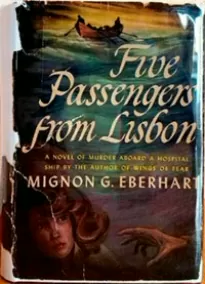Five Passengers from Lisbon

- Автор: Mignon Eberhart
- Жанр: Детективы
Читать книгу "Five Passengers from Lisbon"
5
He was wearing a uniform with Air Corps insignia. His coat was flung loosely around his shoulders. His face was shaded somewhat by his cap, but she caught the brief smile he gave her as he held out cigarettes.
"As a matter of fact"—he shifted the cigarettes, opened a lighter expertly with his left hand and held the flame for her cigarette—"as a matter of fact, I'm not supposed to be here. I'm a patient, you know. And at this hour every patient is tucked away and accounted for. But they give me a little extra leeway because I drew a two-bunk cabin and the other bunk is empty. Or rather my eagles drew it; the rank, not the man. Besides, the ship is not as heavily loaded this trip as she has been up to now. And then I'm what is called ambulatory. That is, I can walk around and don't require a nurse's care. One of the doctors sees me every day." He slid the lighter into his pocket; his coat swung like a cape over his broad shoulders. He looked down at her and then leaned against the railing again and said: "Looks as if we're running into fog after the storm. A good thing it wasn't last night. Your rockets might never have been seen."
It was curious how familiar he seemed to her, yet she was sure she had not known him. It was rather as if she had always known that she would know him some time. And that, of course, was absurd. Nevertheless, she found herself leaning against the railing too, companionably, holding the cigarette he had lighted for her in her hand. He added quickly, as if he regretted introducing a topic which must inevitably hold horror for her: "But that's luckily in the past. I assumed from what Captain Svendsen said that you lived in Paris for some time."
Had Captain Svendsen set him to question her, spy out any secrets she had? If so, he'd find nothing. She said: "Yes, that's true. I was there when the war began."
He smoked for a long moment, staring out toward the black sea and sky, somewhere in the dark distance where they met. Finally, he said: "I was in Paris then. But of course, as Captain Svendsen said, it's a big city! There were several million other people in Paris that fall, too. Still, the little American colony was pretty close. You often knew about other people from home. Especially . . ." He put his cigarette to his lips and the glow lighted his face "especially after the war actually began. Who were some of the people you knew best? Americans, I mean."
"Why, I . . ." She hesitated; yet probably it was actually quite in order, and quite American; the old business of finding mutual friends. In any case it didn't matter. She replied literally: "Not many, really. The war began so soon and most of the Americans went home as soon as possible. The friends with whom I was traveling went home almost at once. Of course there were some other people . . ." Smoking, slowly, she dredged names and faces out of her memory, casual acquaintances all of them, all but forgotten in the intervening time. He listened to each name rather intently, so again the thought crossed her mind that Captain Svendsen might have asked him to question her, with a view to proving her own identity.
If so, however, he was not doing it very expertly or very objectively, really. It was more as if he had some obscure yet personal motive of his own.
Yet that was not likely; it was, in fact, extremely unlikely. She dismissed it abruptly. And when she'd finished the little unimportant roll call, he said merely: "The good old business of it's a small world doesn't seem to fit in this case, does it? Of course I recognized the Cates name. Any school child would know that!" He laughed shortly and put his cigarette to his lips. "Andre Messac is not a common name."
Mickey must have returned to the deck by now. She glanced over Josh Morgan's shoulder, but the deck was empty and white. She replied: "It is not an uncommon name."
"No? Well." He smoked for a moment, and added: "Was he around Paris that first winter?"
"Yes. But then the Germans came."
He seemed to wait for a moment, as if for her to add to that. When she didn't, he said finally: "It's queer, really, to accept the fact that the war in Europe is over. I can't, yet. I know it with my mind, but I feel . . ." Again he paused, looking out into the darkness beyond the rim of light close to the ship, and then said, in a different, harder voice: "I feel as if there are still things to do."
She glanced at him quickly; his mouth looked stern and hard; the one hand that lay on the railing had doubled up suddenly into a fist. "I don't know what you mean. The war in Europe is over."
"Yes, yes, of course. You realize that Captain Svendsen asked me to come to his quarters in order to discover whether or not I knew you."
"Yes. That is, I supposed so. Because of the murder."
Colonel Morgan's shoulders lifted in a quick, easy shrug. "He probably hoped to check your account of yourself. I know about the murder—it isn't supposed to be known, of course—but that's due to my eagles too. Later I—well, I got to thinking we had met somewhere."
"I don't think so."
"No . . . No, I must be wrong."
It was an odd little interview. Mickey would be waiting. She'd better return to the other side of the deck to the place where he had left her and would expect to find her again. She moved away from the railing and without a word Colonel Morgan fell into pace beside her. And, smoking, began to chat about the ship. The food . . . "Steak," he said, "and milk that you'd swear was not twenty minutes from a cow. And eggs." The doctors, the nurses. "They've been in combat, most of them. Under fire off the invasion beachheads. Taking men direct from battle, loading them, operating all day and all night, all three operating rooms going, working at top speed. You'd think, to hear any of them talk, that the patients are the only heroes. Fact is, there's not a nurse or a doctor on this ship who's not, quite simply and honestly, a hero."
He laughed a little as if to cover the depth of feeling in his words, and shrugged his shoulders to adjust his coat. They reached the bow and the deck seemed to rise to meet them at every step. And as they turned, with the sea air strong in their faces, an unexpected small thing happened. The ship thrust into a wave with a sudden heavy motion. Marcia made an unsteady step, wavered, reached for a bulkhead which was too far to touch and Colonel Morgan caught her in his free arm. Caught her closely to him and held her for an instant or two there in the darkness while the ship seemed to hold herself steady, riding the wave. His hard warm cheek brushed her own; his arm was tight and strong, so he seemed to be, just for that fraction of time, the only safe and unmovable thing in the night. Then he laughed a little again and said, but rather unevenly: "Okay?"
"Quite—thanks." Her own voice was uneven too. She pulled herself away although his arm held her, but lightly then until she was steady and balanced. He said: "It's always tough going around the bow. Better hang onto my arm."
She slid her arm through his; she felt a little confused, which was silly. Neither of them spoke. It was darker as they rounded the bow and, as so often in the night at sea, there was the strong sense of being alone and very small in an immensity of darkness. They emerged onto the other side of the deck and Mickey was not there. They reached the door into the main lobby and Colonel Morgan said rather abruptly: "I'd better get back to my quarters before I'm sent back. Coming in?"
"Not just yet. I'm waiting for Andre."
Something flickered in his face, under the bright floodlights; yet actually there was no definable change in expression. "Well, I'll see you again, I hope. It's swell to talk to an American girl again. Good night, Miss Colfax." He smiled, touched his cap in a little friendly salute and disappeared into the lighted passageway of the ship.
She'd wait a few moments more for Mickey and then go down to the cabin.
The ship was quiet and asleep by then. The fog was perceptible now, gray wreaths floated at the edge of the area of light surrounding the ship and reflected a wavering red and gold haze. The
Still Mickey did not come.
Gradually the chill night air and the fog crept through the heavy coat Marcia was wearing. She turned her back to the railing, watching the lighted doorway for Mickey. Thinking once how strange it was to find herself there, on that lighted ship, so full and packed and safe inside, its decks so white and empty, a floating, rosily lighted little hospital going its steady way through the sea and the night.
What a long path had led her to that particular point in time and to that particular place!
How had Josh Morgan happened to reach that same place and that same point in time? Obviously he'd been in active service; probably wounded, which accounted for his presence there, and for the right arm in a sling. He did rather well, however, with his left arm!
Not that it mattered; she thought of the moment on the moving, slippery deck when he'd caught her, with, again, an absurd and childish feeling of confusion. Not that that mattered either! She moved away from the railing. She'd give Mickey three more minutes, then she'd go down to the cabin. She walked slowly along, this time aft.
She passed another, smaller doorway, and, as a matter of fact, out of the bright lane of lights. She strolled into the thick bank of shadow below a rank of lifeboats.
It was unexpectedly dark just there; her eyes were adjusted to lights. But she saw then, a deeper shadow huddled against the bulkhead near her and stopped abruptly.
The outline became clearer. It was a man sagging down upon the deck. His head was bare, his hand outflung limply. She was on her knees beside him, and it was Mickey.
"Mickey, Mickey ..."
He didn't answer; his head sagged limply as she moved him. "Mickey," she cried despairingly. And remembered Alfred Castiogne who was murdered in the lifeboat the night before with a knife in his back.
But Mickey could not be dead. His heart was beating— unless it was the faint, constant vibration of the ship. She thought there was a faint pulse at his wrist. "Mickey . . ." she whispered again, and thought, I must get help. I must hurry. . . . She lowered his head gently to the deck again, turned into the nearest doorway into the ship, and was instantly lost.'
Passageways stretched forward and aft and across; there were lights everywhere and closed doors everywhere. She turned to the right and hurried along a gray-painted passageway. Which way were the wards? There would be nurses there and corpsmen. She came on a bisecting passage and turned again and found herself among offices and laboratories. She turned back. She mustn't scream; there were sick patients asleep but she must get help somehow. She hurried back, took another turn and then was completely lost.
A strange ship is as confusing as a strange city. If she had not been in the portion of the ship reserved for storerooms she would have immediately found people: nurses, corpsmen and doctors on night duty, alert for every sound and every movement. Just for the moment there was no one.
But nothing could really have hurt Mickey; he had slipped and fallen. He had somehow struck his head against the stairs or against the bulkhead.
That was it. He wasn't dead; he might not even be injured. She was hysterical and terrified because Alfred Castiogne, who had nothing to do with Mickey or with her, had been murdered. No one could have struck Mickey. No one could have crept along that deck on stealthy, furtive feet. No one could have waited in the black, small rim of shadow. Murder had been in the little lifeboat—not here.
She pushed open a door and was on deck, but this time again she was on the port side. The deck stretched forward, white and lighted; aft, around the stern, it lost itself in shadow. She'd go back around the deck, back to the starboard side of the ship and Mickey. It seemed a quicker and more direct way than through the ship. She ran along the lighted strip of deck and entered the heavy, sudden shadow around the stern.
It was so sudden and dark a shadow that she groped for the bulkhead to guide her. Fog creeping closer upon the ship was cold and misty on her face. The width of the ship still divided her from Mickey, and the fog was like a curtain further obscuring the shadowy curve of the deck ahead. Behind was a rosy brightness, reflected all around against the wreaths of fog. Here it was only dark and empty, with the rush of the ship through the dark water below sounding very loud.
And very near, there was a curious regularity about the whisper and rush of the waves. Like someone breathing heavily.
She stopped.
But murder had been in the little lifeboat! Not here . . .
Then, with indescribable suddenness and finality, the black water seemed to roar and crash upon her ears, engulfing her, dragging her down across the slippery deck into its own blackness and chaos.
Her fighting, blind hands brushed the middle railing, caught at it, missed, caught hard into space again and then there was nothing but darkness and fog.
It was indeed at about that time that the





